|
|
|
Sort Order |
|
|
|
Items / Page
|
|
|
|
|
|
|
| Srl | Item |
| 1 |
ID:
118510
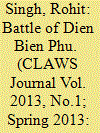

|
|
|
| 2 |
ID:
038670


|
|
|
|
|
| Publication |
London, Andre Deutsch, 1974.
|
| Description |
xiv, 562p.Hbk
|
| Contents |
Includes bibliography, index.
|
| Standard Number |
0233965084
|
|
|
|
|
|
|
|
|
|
|
|
Copies: C:1/I:0,R:0,Q:0
Circulation
| Accession# | Call# | Current Location | Status | Policy | Location |
| 014984 | 923.173/HOO 014984 | Main | On Shelf | General | |
|
|
|
|
| 3 |
ID:
124539
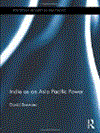

|
|
|
|
|
| Publication |
London, Routledge, 2012.
|
| Description |
xi, 219p.Pbk
|
| Series |
Routledge Security in Asia Pacific Series; 18
|
| Standard Number |
9780415725729
|
|
|
|
|
|
|
|
|
|
|
|
Copies: C:1/I:0,R:0,Q:0
Circulation
| Accession# | Call# | Current Location | Status | Policy | Location |
| 057493 | 355.033054/BRE 057493 | Main | On Shelf | General | |
|
|
|
|
| 4 |
ID:
069125


|
|
|
| 5 |
ID:
131452
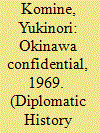

|
|
|
|
|
| Publication |
2013.
|
| Summary/Abstract |
This article demonstrates that during the 1969 Okinawa reversion negotiations, there were both secret agreements and disagreements between the U.S. and Japan regarding the conditions applied to the use of United States bases on Okinawa after reversion. The United States sought to preserve the unrestricted use of its bases on Okinawa for conventional combat operations in regional contingencies including Korea, Taiwan, and Indochina, as well as the emergency re-entry and transit rights of nuclear weapons. Due to the antinuclear public sentiment and fear of the entrapment into regional conflicts, Japan pursued the withdrawal of all nuclear weapons from Okinawa. While the United States insisted on making confidential written arrangements for the nuclear and base issues, Japan attempted to focus on public statements to explain mutual agreements but provided verbal private assurances. In the end, the United States and Japan agreed to maintain U.S. base functions for the continued U.S. deterrent capabilities in East Asia.
|
|
|
|
|
|
|
|
|
|
|
|
|
|
|
|
| 6 |
ID:
101979


|
|
|
|
|
| Publication |
2010.
|
| Summary/Abstract |
EVEN THOUGH in the first post-Soviet decade it declared the intention to integrate into the Asia Pacific region, Russia at that time moved away from those countries that the USSR was especially friendly with in this part of the world - i.e., Vietnam, Laos and Cambodia.
|
|
|
|
|
|
|
|
|
|
|
|
|
|
|
|
| 7 |
ID:
117071


|
|
|
|
|
| Publication |
2012.
|
| Summary/Abstract |
This article examines how and why the French Orientalist, Paul Mus, became one of the leading critics of the Indochina War and an advocate of French decolonization. Most studies of Western Orientalism tend to adopt Saidian approaches to demonstrate the degree to which Western scholars operated from within the confines of the wider colonial project and were influenced by it. Mus does not escape from this critique. However, like Jacques Berque in North Africa, Mus was one of a handful of French Orientalists who not only grew up and pursued their research in the Empire, but also became deeply involved in trying to understand the rising tide of colonial nationalism, the nature of French colonialism and the meaning of decolonization in new ways for the time. This article considers how war, and in particular the experience of violence in the colonial context, shaped Mus's understanding of colonialism, his conception of humanity, and influenced his post-war writings in ways that distinguished him from colonial humanists in charge of the Republican Empire and Orientalists who continued to operate within the colonial power structure. In late 1949, Paul Mus left his position at the head of the French Colonial Academy to renew his pre-war academic career. However, unlike scores of social scientists who had also experienced war, Mus placed that very experience at the centre of his post-war scholarship.
|
|
|
|
|
|
|
|
|
|
|
|
|
|
|
|
| 8 |
ID:
053322
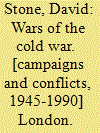

|
|
|
|
|
| Publication |
London, Brassey's, 2004.
|
| Description |
336p.Hbk
|
| Standard Number |
1857533429
|
|
|
|
|
|
|
|
|
|
|
|
Copies: C:1/I:0,R:0,Q:0
Circulation
| Accession# | Call# | Current Location | Status | Policy | Location |
| 048429 | 909.824/STO 048429 | Main | On Shelf | General | |
|
|
|
|
| 9 |
ID:
093095
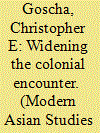

|
|
|
|
|
| Publication |
2009.
|
| Summary/Abstract |
Relying on three inter-Asian colonial debates from French Indochina, this paper attempts to widen our analytical approach to the study of colonialism in Indochina beyond the 'colonizer'-'colonized' opposition by factoring in the relationships among the diverse Asian colonized living within the colonial state without downplaying the important role Western colonialism played in transforming those very relationships or being affected by them. The French Indochinese case is helpful, for it suggests that inter-Asian connections did anything vanish, but rather intensified because of the colonial experience. Numerous Lao, Khmer, Vietnamese and Chinese subject elites continued to engage each other and the French in fascinating and sometimes heated debates about the political, legal, cultural and economic place each group held in French Indochina - or did not want to hold. This directly affected how they came to interact with one another in new ways, essential to understanding the complexity of the colonial encounter at the time and can provide new insights into post-colonial and international history. Lastly, this wider approach to studying the colonial encounter allows us to view the French side of the colonial equation from a new vantage point.
|
|
|
|
|
|
|
|
|
|
|
|
|
|
|
|
|
|
|
|
|